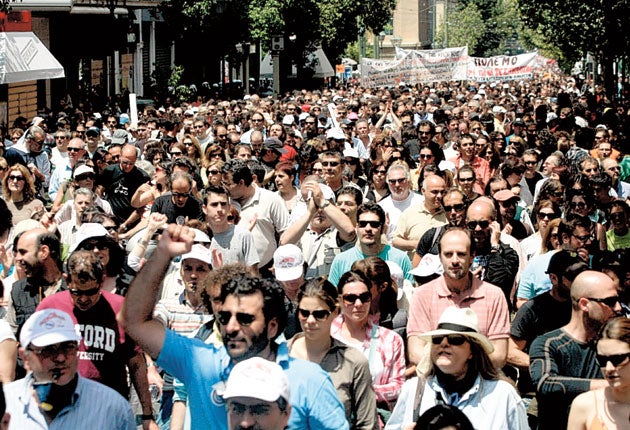Cracks appear in EU unity as fears spread for future of the eurozone

Your support helps us to tell the story
From reproductive rights to climate change to Big Tech, The Independent is on the ground when the story is developing. Whether it's investigating the financials of Elon Musk's pro-Trump PAC or producing our latest documentary, 'The A Word', which shines a light on the American women fighting for reproductive rights, we know how important it is to parse out the facts from the messaging.
At such a critical moment in US history, we need reporters on the ground. Your donation allows us to keep sending journalists to speak to both sides of the story.
The Independent is trusted by Americans across the entire political spectrum. And unlike many other quality news outlets, we choose not to lock Americans out of our reporting and analysis with paywalls. We believe quality journalism should be available to everyone, paid for by those who can afford it.
Your support makes all the difference.Europe's governments struggled to mask sharp differences yesterday even as they backed new sanctions for indebted countries in the battle to prevent a debt crisis from spiralling into an emergency that threatens the very survival of the euro.
Germany's two houses of parliament rubber-stamped the country's contribution to the €750bn (£652bn) package of loans and guarantees, the so-called "shock and awe" package hammered out by European leaders this month to prevent a Greek-style debt crisis from afflicting any other nation in the euro area with threatened bankruptcy. Germany's backing, despite a mood of public anger over the cost of bailing out Greece, was a clear signal to the markets that the biggest eurozone economy is strongly committed both to ending the debt crisis and to propping up the single currency in the longer term.
But EU finance ministers meeting in Brussels to discuss an overhaul of the rules underpinning the euro were under renewed pressure after a spat between the leaders of France and Germany this week triggered fresh market jitters. Since the bailout package was agreed, it has become clear that governments also need to back it with a major review of the rules that govern the euro. But anything that would require an amendment to the EU Treaty risks provoking a political crisis, not least in Britain.
The French Finance Minister, Christine Lagarde, and her German counterpart, Wolfgang Schaeuble, appeared together before the press and stressed they had agreed on steps to push through a collective deal including political and financial sanctions. On paper, countries in the eurozone can already be fined for exceeding their deficit and debt limits. But fines have never been imposed, a factor blamed for Greece's debt being allowed to spiral out of control.
The new steps, details of which have yet to be worked out, are designed to ensure better budgetary discipline, to move more quickly to pre-empt any future crisis and improve the economic competitiveness of all 15 eurozone members. "We agreed to improve co-ordination," Ms Lagarde said. "What is guiding us right now is being pragmatic and efficient and working as quickly as possible to get things moving." EU President Herman van Rompuy, added: "Everyone shares the sense of urgency and the will to go forward as a group of 27. Today was only the start of a process."
But it is far from certain that this superficial show of unity will reassure investors, who were taking flight from the euro this week. Markets continued to slide yesterday despite the German vote. The currency has fallen by 6 per cent against the dollar this month amid fears that Portugal, Spain or other eurozone countries would also be sucked up in the debt spiral, and investors are demanding changes to ensure the euro's future stability.
But the harder the EU's leading players have battled to dig their way out of the crisis, the deeper the hole has grown. The spectacular lack of co-ordination and unity at the start of the Greek debacle in February fuelled fears of contagion.
Ms Merkel has called for a radical overhaul of the rules and has baulked at French suggestions that Germany should instead stimulate its own domestic demand. Ms Merkel has called on other eurozone members to follow Germany's lead in adopting stringent and legally binding fiscal rules and agree to sanctions if they break the debt and deficit benchmarks.
On top of losing EU funding, a German government paper prepared for yesterday's meeting said that "countries that seriously infringe the rules of the monetary union should have their voting rights in the Council suspended for at least one year". Before, Germany had also called for countries to be expelled from the eurozone altogether.
Batting off accusations that Germany was hijacking the whole process for populist reasons and thus risking the very foundations of EU decision-making, Mr Schaeuble said: "Ours was only one of the proposals and of course we are interested in listening to what everyone else has to say." He appeared to soften earlier demands for more fundamental changes that would require changing and re-ratifying the Lisbon Treaty, an idea that has most other member states breaking into a cold sweat. Ms Lagarde said: "There are some who've supported treaty change, other who've rejected it. We'll work as much as possible within the new treaty, it's much faster."
Rejecting the idea of closer budgetary co-ordination, George Osborne, the Chancellor, said national parliaments had to be "the first people told about the important tax and spending decisions that countries like Britain have to take".
Join our commenting forum
Join thought-provoking conversations, follow other Independent readers and see their replies
Comments